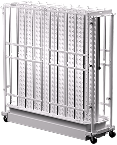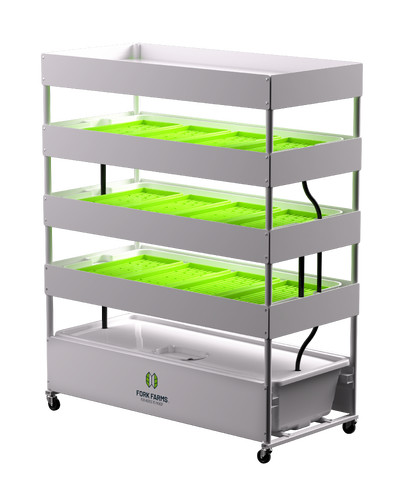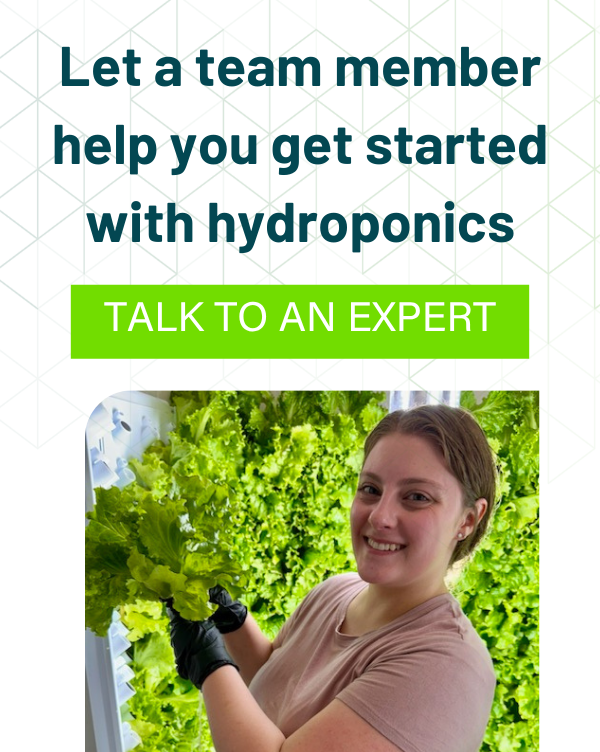Are Hydroponic Gardens Better Than Soil-Based Gardens?
Are you interested in cultivating produce and starting your own garden? Perhaps you’re considering a hydroponic growing system versus an outdoor garden.
While you may be intrigued by the idea of a hydroponic garden, you might also have heard there are certain drawbacks compared to a traditional soil-based garden. It's only natural to wonder whether these concerns hold any truth and if traditional soil-based gardens are indeed better than starting your own indoor hydroponic farm.
Here, we will explore the differences between a hydroponic growing system and traditional outdoor, soil-based gardens. We will address some of the concerns that new growers have about new gardening solutions and explore some of the reasons why a hydroponic garden might be the best option for you.
Comparing Outdoor Soil-Based Growing vs. Indoor Hydroponic Systems
Soil-based growing refers to the traditional approach where plants get their nutrients and support from the soil itself. This method has been widely used in gardening and agriculture for centuries.
On the other hand, hydroponics is a method of cultivating plants without soil. Instead, nutrient-rich water solutions are used to directly deliver essential nutrients to the plants' roots.
Addressing Concerns about Hydroponic Systems
It is important to acknowledge reservations regarding hydroponic systems and their perceived drawbacks. Some concerns include sustainability, the production of unsafe and lower nutritional and quality produce, yields, and inefficient production. Additionally, critics argue that hydroponics offers less educational value for students.
The Benefits of Hydroponic Gardening vs. an Outdoor Garden
Contrary to these reservations, hydroponic gardening offers numerous advantages over traditional soil-based gardening. First, it allows for higher crop yields with less water, space, and costs. This makes it an attractive option for areas with limited resources.
Furthermore, hydroponics enables precise control over growing conditions, including nutrient levels, pH, and environmental factors. As a result, plants experience faster growth rates and higher yields compared to traditional soil-based cultivation.
Hydroponic Gardens Offer Better Energy Efficiency and Sustainability
Hydroponic gardening promotes energy efficiency and sustainability in several ways. It conserves water through efficient usage, reducing water waste compared to soil-grown crops. Additionally, the case can be made that hydroponic gardens consume fewer resources overall eliminating many of the resource costs associated with cultivating and maintaining an outdoor garden.
Moreover, hydroponics minimizes food waste, contributing to sustainable food production practices and resource conservation.
Is Produce Safer When You Grow Indoors With Hydroponics?
One of the key advantages of hydroponic gardening is the controlled environment it provides, which minimizes the risks of pests and diseases. This eliminates the need for harmful pesticides or herbicides that can be needed in an outdoor garden, resulting in cleaner and safer produce for consumption. Furthermore, hydroponic systems eliminate soil-borne pathogens, reducing the need for extensive processing or the use of harmful chemicals.
Additionally, hydroponics allows for precise control over nutrient levels, ensuring that plants receive the optimal nutrients needed to grow. This not only enhances the quality of the produce but also increases its nutritional value. Plus, the absence of soil in hydroponic systems reduces the risk of heavy metal contamination, making the produce even safer for consumption.
Enhanced Quality and Flavor: Harvested at the Peak of Freshness
One of the key advantages of hydroponics is the ability to harvest crops at their peak freshness. Unlike traditional soil-based gardens, hydroponics eliminates the need for transportation, reducing the risk of nutritional degradation. This means that the produce retains its optimal nutritional quality without the need for mass processing or the use of preservatives and chemicals. In fact, produce from hydroponic farms often boasts a more consistent nutritional profile compared to soil-grown crops.
Hydroponic Gardens Enable Year-round Growing: Overcoming Weather Restrictions
The controlled environment provided by hydroponic systems eliminates the limitations imposed by weather conditions. Regardless of climate variations, hydroponics allows for consistent and uninterrupted produce supply throughout the year. This advantage is particularly valuable for ensuring a steady and reliable source of fresh produce.
Scalability Advantage: Maximizing Space Utilization With an Indoor Garden
One of the unique features of hydroponic systems is their scalability. Hydroponics can be tailored to fit any growing space, whether a small setup or a large commercial farm. Vertical setups, in particular, offer an efficient solution for optimizing limited space, making them ideal for urban gardening or areas with land constraints.
By increasing plant density and productivity, hydroponics achieves higher yields compared to traditional gardening methods. Moreover, the modular nature of hydroponics allows for easy expansion, ensuring flexibility and adaptability to changing needs.
Hydroponic Farm Systems Provide Education Value to Students: Nurturing Curiosity and Critical Thinking
Hydroponics presents an excellent opportunity to nurture curiosity and critical thinking among students. By encouraging experimentation with hydroponic techniques, students develop problem-solving skills and cultivate a scientific mindset.
The controlled environment provided by hydroponics also creates an effective learning environment. With minimal initial setup requirements, hydroponics can be operated in any indoor learning space, offering predictable conditions for observation and measurement. This enhances the learning experience for students, as they can easily track and analyze the growth of plants in a hydroponic system. This hands-on approach allows them to apply their theoretical knowledge to real-life situations, fostering a deeper understanding of scientific concepts.
Furthermore, hydroponics offers a unique opportunity for students to explore sustainable agriculture practices. By growing plants without soil and using nutrient-rich water solutions, students can witness firsthand how this method conserves water and reduces the need for pesticides and herbicides. This promotes environmental consciousness and encourages students to think critically about the future of food production.
In addition, hydroponics provides a platform for interdisciplinary learning. Students can integrate various subjects such as biology, chemistry, and mathematics to optimize the growth conditions of their plants. They can conduct experiments, collect data, and analyze results, honing their analytical and problem-solving skills.
Overall, hydroponics serves as an innovative and engaging tool for educators to create scientific curiosity and critical thinking among students. By incorporating this technique into the curriculum, students can develop a lifelong passion for scientific exploration and contribute to the advancement of sustainable agricultural practices.
Fork Farms/Flex Farm Advantage
At Fork Farms, we are dedicated to revolutionizing the world of hydroponic gardening. Our product, Fork Farms/Flex Farm Advantage represents the pinnacle of hydroponic technology efficiency, scalability, and transformation.
Unparalleled Support from the Fork Farms Team of Hydroponics Experts
Fork Farms provides access to our team of hydroponics experts, who provide comprehensive, end-to-end support for your operation. We are committed to ensuring your success in hydroponic farming, and our experts will guide you every step of the way.
Collaborate with Like-Minded, Innovative Hydroponic Growers
You also become part of the Farmative community, a vibrant network of like-minded and innovative growers. This community serves as a platform for collaboration, allowing you to exchange ideas, insights, and experiences with fellow hydroponic enthusiasts.
The Benefits of Flex Farm
The Flex Farm, our self-contained, scalable, vertical hydroponic growing system, allows you to unlock a number of advantages that will revolutionize your farming experience:
Increased Crop Yield with Minimal Water and Space Requirements
The Flex Farm enables you to produce more crops while utilizing significantly less water and space. With 288 plant spaces, you can harvest over 25 pounds of leafy greens every month, maximizing your productivity.
Zero Food Miles with A Hydroponic Flex Farm
With the Flex Farm, you eliminate the need for food transportation. Growing your produce on-site reduces carbon emissions and contributes to a more sustainable future.
45 Times More Food Production Compared to Traditional Soil Agriculture
Compared to traditional soil agriculture, hydroponic farming with the Flex Farm allows for an astounding 45 times more food production. This exponential increase in productivity ensures a steady and abundant food supply.
Drastic Reductions in Resources When Using A Hydroponic Garden
Not only does hydroponic gardening with the Flex Farm offer a significant increase in food production, but it also drastically reduces reliance on natural resources. Among them is the amount of water required for cultivation. Hydroponics uses up to 98% less water than traditional soil agriculture, making it a highly sustainable and environmentally friendly option.
What’s more, the Flex Farm is an easy-to-manage solution that only requires about two hours of regular maintenance per month.
Classroom Support from Farmative Community
Yet another benefit of the Flex Farm system is ongoing support from the Farmative community of growers. This support all but guarantees growing success while freeing up educators to focus on teaching kids.
The Flex Farm also includes free, integrated STEM (science, technology, engineering, and mathematics) learning tools aligned to Next Generation Science Standards, which were established to help students gain a deeper understanding of core scientific concepts.
In addition, the Flex Farm incorporates a robust online library of resources to assist in the farming process–courses, tutorials, activities, and more create a holistic learning experience that extends far beyond any single platform or method.
It all goes to show that when you have the right technology, coupled with end-to-end growing support, anyone can be a successful hydroponic farmer!























